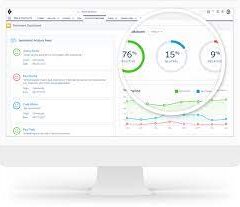The Impact of AI on Jobs: A Historical and Transformative Perspective
For centuries, people have feared losing jobs to technological advancements. From the introduction of the printing press in 1440 to the widespread adoption of assembly lines in manufacturing, history has followed a familiar pattern: a wave of panic followed by a surge of innovation. Today, with AI in the spotlight, headlines warn of job-stealing robots. Yet, AI is not here to take jobs; it’s revealing new ones—and at an unprecedented pace.
A Paradigm Shift: AI as a Job Creator
Contrary to popular belief, AI is reshaping the job market for the better. Rather than replacing workers, it amplifies human potential, pushing society toward work that is creative, strategic, and uniquely human. Instead of asking, “Will AI take my job?” the better question is, “What new opportunities can AI unlock?” The answers are exciting and transformative.
Lessons from the Past
Technological disruption is far from new. The printing press, the weaving loom, and even the internet all provoked fears of mass unemployment. Yet, each time, these innovations sparked transformation rather than devastation.
Consider the ATM, introduced in the 1960s. Initially, bank tellers feared redundancy. However, rather than replacing tellers, ATMs automated routine tasks, freeing human workers to focus on customer service and financial advising. In fact, the number of bank tellers increased in the decades following ATM adoption.
AI follows the same trajectory. By handling repetitive tasks like sorting emails or managing schedules, AI frees workers to focus on areas requiring emotional intelligence, creativity, and problem-solving.
AI: A Partner, Not a Competitor
AI excels in areas that humans struggle with, such as processing vast datasets, recognizing patterns, and executing repetitive tasks with precision. However, it lacks empathy, context, and abstract thinking—traits that remain uniquely human.
For example, IBM Watson can analyze millions of medical journals to suggest treatment options. Yet, a doctor’s role remains indispensable, as patients need empathy, understanding, and a human touch. Similarly, legal AI tools like CaseText can streamline research, but building persuasive arguments and negotiating terms require skills no algorithm can match.
Rather than replacing professionals, AI enhances their productivity, enabling them to focus on higher-value tasks.
The Birth of Entirely New Industries
AI is not only reshaping existing jobs but also creating new roles and industries. The rise of generative AI has introduced positions like prompt engineers, who design effective queries to maximize AI’s output. Similarly, the need for unbiased algorithms has created the field of data ethics, where specialists ensure AI systems prioritize equity and fairness.
These roles underscore an important reality: AI doesn’t eliminate opportunities—it redefines them.
Addressing Ethical Challenges
AI’s reliance on data is both its strength and its vulnerability. Algorithms trained on biased data can perpetuate harmful stereotypes, as seen in Amazon’s failed hiring algorithm, which penalized women. This challenge has given rise to data ethicists tasked with auditing algorithms and designing fair systems, further showcasing how AI disruption creates new fields and opportunities.
Augmentation Over Replacement
Fear of AI stems from misunderstanding its role. Machines are adept at repetitive and analytical tasks, but they lack the nuanced understanding required for roles in fields like art, music, and medicine. AI tools such as Adobe Sensei or AIVA enhance creativity, allowing artists and musicians to experiment, iterate, and push boundaries.
Just as the printing press democratized writing rather than ending it, AI empowers workers to focus on what makes us uniquely human.
A Future Worth Working Toward
AI represents a profound shift in how society views work. It is not a destroyer of jobs but a catalyst for transformation. By automating inefficiencies and reinforcing human strengths, AI unlocks opportunities yet to be imagined.
Rather than fearing the rise of AI, embracing its potential can lead to a future where work is more meaningful, creative, and impactful—an evolution worth striving for.










